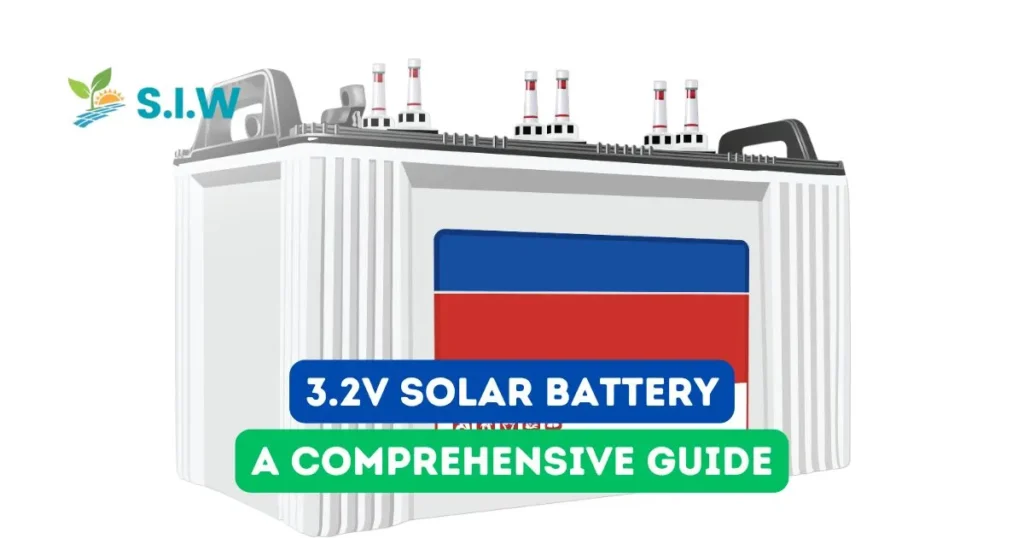As the world transitions towards renewable energy, solar power has emerged as a leading solution for both residential and commercial needs. Among the myriad of components that make up a solar power system, solar batteries play a crucial role. In this article, we will explore the specifics of 3.2V solar batteries, their applications, advantages, and considerations for choosing the right battery for your solar setup.
What Are 3.2V Solar Batteries?
The Basics of 3.2V Batteries
Solar batteries are essential for storing energy generated by solar panels. They ensure that power is available even when the sun is not shining. A 3.2V solar battery refers to a battery with a nominal voltage of 3.2 volts. This voltage is relatively low compared to other types of batteries commonly used in solar energy systems, such as 12V or 24V batteries.
Battery Chemistry and Design
Most 3.2V solar batteries are lithium iron phosphate (LiFePO4) batteries. This type of lithium battery is known for its stability, safety, and long cycle life. LiFePO4 batteries offer several advantages over other lithium-ion batteries, including enhanced thermal stability and a longer lifespan. Their design ensures that they can withstand a high number of charge and discharge cycles, making them a reliable choice for solar power storage.
Advantages of 3.2V Solar Batteries
Longevity and Durability
One of the most significant advantages of 3.2V solar batteries is their longevity. LiFePO4 batteries, in particular, are known for their impressive lifespan, often exceeding 2000 charge cycles. This longevity means that users can expect their batteries to perform well for many years, making them a cost-effective investment in the long run.
Safety Features
Safety is a critical factor when it comes to choosing a solar battery. LiFePO4 batteries are renowned for their safety features. Unlike other lithium-ion batteries, they are less prone to overheating and thermal runaway. This stability reduces the risk of fires or explosions, making 3.2V LiFePO4 batteries a safer choice for solar energy storage.
Efficiency and Performance
3.2V solar batteries offer excellent efficiency and performance. They can provide consistent power output and are capable of fast charging and discharging. This efficiency is crucial for ensuring that solar energy is stored and used effectively, maximizing the overall performance of a solar power system.
Applications of 3.2V Solar Batteries
Residential Solar Systems
In residential solar power systems, 3.2V solar batteries are often used in configurations where multiple batteries are connected in series or parallel to achieve the desired voltage and capacity. These batteries are suitable for small to medium-sized homes, providing a reliable power source for essential household needs.
Off-Grid Solar Systems
Off-grid solar systems, which are designed to operate independently of the main power grid, benefit significantly from 3.2V solar batteries. These batteries can be combined to create a robust energy storage solution, ensuring a continuous power supply in remote locations where grid access is unavailable.
Emergency Backup Power
3.2V solar batteries are also used in emergency backup power systems. In the event of a power outage, these batteries can provide essential power to critical devices and systems, such as communication equipment, medical devices, and refrigeration. Their reliability and performance make them an excellent choice for ensuring that you remain prepared during unexpected power interruptions.
Considerations When Choosing 3.2V Solar Batteries
Capacity and Voltage
When selecting a 3.2V solar battery, it is essential to consider its capacity and voltage. The capacity of a battery, measured in ampere-hours (Ah), determines how much energy it can store. The voltage, on the other hand, affects how the battery will integrate with your solar power system. For optimal performance, ensure that the capacity and voltage of the battery align with your system’s requirements.
Compatibility with Solar Panels
Compatibility between the solar battery and the solar panels is crucial for efficient energy storage. Ensure that the 3.2V battery is compatible with your solar panel system in terms of voltage and current. Using batteries that are not compatible can lead to reduced performance and potential damage to the components.
Cost and Budget
Cost is always a consideration when investing in solar batteries. While 3.2V LiFePO4 batteries are generally more expensive upfront compared to other types of batteries, their long lifespan and safety features often make them a more cost-effective option over time. Evaluate your budget and consider the long-term benefits of investing in a high-quality battery.
Maintenance and Care
Proper maintenance and care are essential for maximizing the lifespan of your 3.2V solar battery. Regularly check the battery’s performance and ensure that it is kept in optimal conditions. Avoid exposing the battery to extreme temperatures and follow the manufacturer’s guidelines for maintenance to ensure reliable operation.
Conclusion
3.2V solar batteries offer a valuable solution for energy storage in solar power systems. With their long lifespan, safety features, and efficiency, they provide a reliable and effective means of storing solar energy. Whether you are using them for residential solar systems, off-grid applications, or emergency backup power, understanding the advantages and considerations associated with these batteries will help you make informed decisions and optimize your solar energy setup.
Investing in a 3.2V solar battery can enhance the performance of your solar power system, ensuring that you have access to stored energy whenever you need it. By considering factors such as capacity, compatibility, and cost, you can select the right battery for your needs and enjoy the benefits of a well-designed solar energy system.








